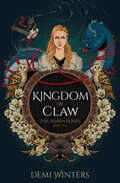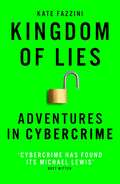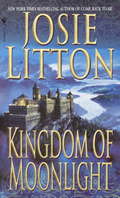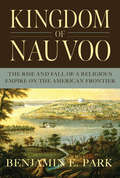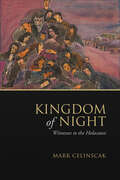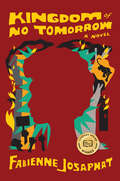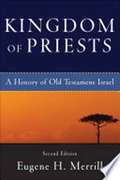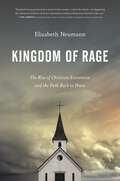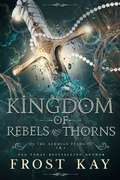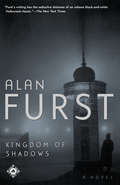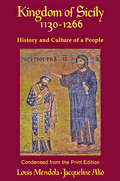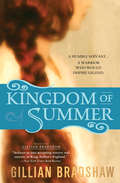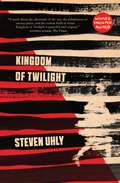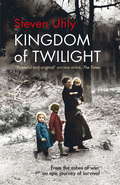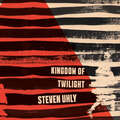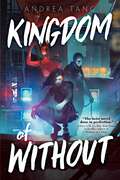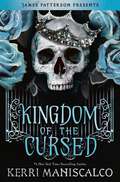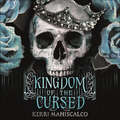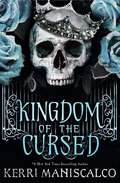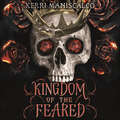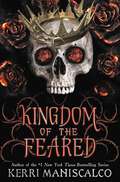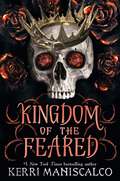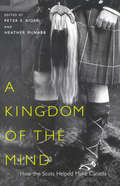- Table View
- List View
Kingdom of Claw: The Ashen Series; Book Two (The Ashen Series #2)
by Demi WintersReturn to the Kingdom of Íseldur, where enemies become lovers and dark secrets hide around each corner, the second novel in the Ashen series.In the aftermath of a harrowing journey, Silla Nordvig&’s dreams of a simple life have been shattered. Beaten, betrayed, and reeling from the revelation of her true name, she flees Kopa with Reynir Galtung, ruthless leader of the Bloodaxe Crew. But when they're forced into hiding together, Silla soon discovers that Rey has been keeping secrets of his own.Stuck in a shield-home with the murderous man she thought she knew, Silla forms a new plan: master the magic flowing through her veins to save her sister. But before she can do that, Silla must face her most formidable opponent yet—her own inner demons.Saga Volsik has nothing to lose. They&’ve murdered her family. Stolen her throne. And now they expect her to marry their son, but not if she can dismantle Queen Signe&’s plans first. The only problem? The handsome Zagadkian dignitary who knows far too many of her secrets.Silla and Saga will need to find the strength to step into their destiny and stop chaos from sweeping across the land. Meanwhile, dark threads continue to weave themselves through Íseldur as magic long thought dead begins to wake.
Kingdom of Lies: Unnerving adventures in the world of cybercrime
by Kate FazziniWould you say your phone is safe, or your computer? What about your car? Or your bank? There is a global war going on and the next target could be anyone – an international corporation or a randomly selected individual. From cybercrime villages in Romania to intellectual property theft campaigns in China, these are the true stories of the hackers behind some of the largest cyberattacks in history and those committed to stopping them. You&’ve never heard of them and you&’re not getting their real names. Kate Fazzini has met the hackers who create new cyberweapons, hack sports cars and develop ransomware capable of stopping international banks in their tracks. Kingdom of Lies is a fast-paced look at technological innovations that were mere fantasy only a few years ago, but now make up an integral part of all our lives.
Kingdom of Moonlight
by Josie LittonReaders were first captivated by the tantalizing kingdom of Akora in Josie Litton’s breathtakingDream Island. Now the legendary nation renowned for the strength of its warriors--and the allure of its women--faces a threat to its future. Only the forbidden passion between an outsider and its own young princess can determine its fate. . . . Kingdom of Moonlight It is the first trip abroad for Kassandra, the courageous princess of Akora. Enamored of all things English, the exotic beauty is eager to mingle with London society--and meet her first English gentleman. But the striking man she discovers in her brother’s home is quite the opposite of what she expected. Powerful and commanding as an Akoran warrior, he hardly resembles the sensitive knight she’d envisioned--yet he is exactly what she will need. For Kassandra’s journey is about to bring her face-to-face with both the man of her dreams and her most terrifying fear. . . .
Kingdom of Nauvoo: The Rise And Fall Of A Religious Empire On The American Frontier
by Benjamin E. ParkAn extraordinary story of faith and violence in nineteenth-century America, based on previously confidential documents from the Church of Jesus Christ of Latter-day Saints. Compared to the Puritans, Mormons have rarely gotten their due, treated as fringe cultists at best or marginalized as polygamists unworthy of serious examination at worst. In Kingdom of Nauvoo, the historian Benjamin E. Park excavates the brief life of a lost Mormon city, and in the process demonstrates that the Mormons are, in fact, essential to understanding American history writ large. Drawing on newly available sources from the LDS Church—sources that had been kept unseen in Church archives for 150 years—Park recreates one of the most dramatic episodes of the 19th century frontier. Founded in Western Illinois in 1839 by the Mormon prophet Joseph Smith and his followers, Nauvoo initially served as a haven from mob attacks the Mormons had endured in neighboring Missouri, where, in one incident, seventeen men, women, and children were massacred, and where the governor declared that all Mormons should be exterminated. In the relative safety of Nauvoo, situated on a hill and protected on three sides by the Mississippi River, the industrious Mormons quickly built a religious empire; at its peak, the city surpassed Chicago in population, with more than 12,000 inhabitants. The Mormons founded their own army, with Smith as its general; established their own courts; and went so far as to write their own constitution, in which they declared that there could be no separation of church and state, and that the world was to be ruled by Mormon priests. This experiment in religious utopia, however, began to unravel when gentiles in the countryside around Nauvoo heard rumors of a new Mormon marital practice. More than any previous work, Kingdom of Nauvoo pieces together the haphazard and surprising emergence of Mormon polygamy, and reveals that most Mormons were not participants themselves, though they too heard the rumors, which said that Joseph Smith and other married Church officials had been “sealed” to multiple women. Evidence of polygamy soon became undeniable, and non-Mormons reacted with horror, as did many Mormons—including Joseph Smith’s first wife, Emma Smith, a strong-willed woman who resisted the strictures of her deeply patriarchal community and attempted to save her Church, and family, even when it meant opposing her husband and prophet. A raucous, violent, character-driven story, Kingdom of Nauvoo raises many of the central questions of American history, and even serves as a parable for the American present. How far does religious freedom extend? Can religious and other minority groups survive in a democracy where the majority dictates the law of the land? The Mormons of Nauvoo, who initially believed in the promise of American democracy, would become its strongest critics. Throughout his absorbing chronicle, Park shows the many ways in which the Mormons were representative of their era, and in doing so elevates nineteenth century Mormon history into the American mainstream.
Kingdom of Night: Witnesses to the Holocaust
by Mark CelinscakIn April 1945, when the Bergen-Belsen concentration camp was surrendered and handed over to the British Army, Canadian forces arrived on scene to provide support, to bear witness, and to document the crimes. They were overwhelmed, understaffed, and left without adequate supplies, equipment, and medicine. Their encounters at the camp were haunting, transformative experiences that forever changed their lives. In Kingdom of Night, Mark Celinscak reveals the engagement of Canadian troops and other personnel at the Bergen-Belsen concentration camp. The book brings together a series of gripping, often deeply moving accounts that demonstrate the critical relief work carried out by Canadians who have been largely overlooked for more than seventy-five years. It outlines in both stark and moving detail what a cross-section of Canadians both said and did during the liberation efforts at one of the most notorious sites in Hitler’s camp system. In addition, biographical overviews are presented for each Canadian featured in the book, not only highlighting some of their life-saving and humanitarian work, but also revealing what ultimately became of their lives after the war. Kingdom of Night depicts the gruelling efforts by those who assisted the victims of one of the greatest crimes in history.
Kingdom of No Tomorrow
by Fabienne JosaphatFrom a PEN/Bellwether Prizewinner, a "beautifully convincing slice of history" novel about the Black Panther Party, perfect for fans of The Love Songs of W. E. B. Dubois (Barbara Kingsolver). Nettie Boileau joins the Black Panthers&’ Free Health Clinics in Oakland in 1968 and is soon swept up in an all-consuming love affair with Melvin Mosley, a defense captain of the Black Panther Party. When Nettie and Melvin head to Chicago to help launch the Illinois chapter of the Panthers, they find themselves targets of J. Edgar Hoover&’s famous covert campaigns against civil rights leaders. As she learns more about the inner workings of the Panthers, Nettie discovers that fighting for social justice may not always mean equal justice for women. Fabienne Josaphat&’s Kingdom of No Tomorrow is a timely story of self-determination and revolution amid injustice.
Kingdom of Priests: A History of Old Testament Israel
by Eugene H. MerrillFrom the origins and exodus to the restoration and new hope, Kingdom of Priests offers a comprehensive introduction to the history of Old Testament Israel. Merrill explores the history of ancient Israel not only from Old Testament texts but also from the literary and archeological sources of the ancient Near East. After selling more than 30,000 copies, the book has now been updated and revised. The second edition addresses and interacts with current debates in the history of ancient Israel, offering an up-to-date articulation of a conservative evangelical position on historical matters. The text is accented with nearly twenty maps and charts.
Kingdom of Rage: The Rise of Christian Extremism and the Path Back to Peace
by Elizabeth NeumannA former counterterrorism official explores how modern evangelicalism and right-wing conservatism intermingled to form the combustible ideology that resulted in the January 6 attacks on the Capitol—and which threatens to destroy the American Church from within. How did a Church that purports to follow the teachings of Jesus - the Prince of Peace - become a breeding ground for violent extremism? When Elizabeth Neumann began her anti-terrorism career as part of President George W. Bush&’s Homeland Security Counsel in the wake of the September 11 attacks, she expected to spend her life protecting her country from the threat of global terrorism. But as her career evolved, she began to perceive that the greatest threat to American security came not from religious fundamentalists in Afghanistan or Iraq but from white nationalists and radicalized religious fundamentalists within the very institution that was closest to her heart – the American evangelical church. And she began to sound the alarm, raising her concerns to anyone in government who would listen, including testifying before Congress in February of 2020. At that time, Neumann warned that anti-Semitic and white supremacist terrorism was a transnational threat that was building to the doorstep of another major attack. Shortly after her testimony, she resigned from her role as Department of Homeland Security Assistant Secretary for Counterterrorism and Threat Prevention in protest of what she believed was then-President Trump&’s failure of leadership and his stoking of the hatred, anger, and division from which she had dedicated her life to protecting her country. Her worst fears came true when she witnessed the attack on the capital on January 6, 2021. In Kingdom of Rage, Neumann explores the forces within American society that have encouraged the radicalization of white supremacist, anti-government and other far-right terrorists by co-opting Christian symbols and culture and perverting the faith&’s teachings. While Neumann offers decades of insights into the role government policies can play to prevent further bloodshed, she believes real change must come from the within the Christian church. She shines a bright light on the responsibility of ordinary Americans – and particularly American Christians – to work within their families and their communities to counteract the narrative of victimization and marginalization within American evangelicalism. Her goal for this book is not only to sound a warning about one of the greatest threats to our security but to rescue the Church from the forces that will, if left unchecked, destroy it – culturally, morally, and ultimately quite literally. This is a book for anyone who wants to understand the unholy marriage of right-wing politics and Christian exceptionalism in America and who wants to be a part of reversing the current path towards division, hatred, violence and the ultimate undermining of both evangelical Christianity and American democracy.
Kingdom of Rebels and Thorns: The Aermian Feuds (The Aermian Feuds)
by Frost KayLong live the rebellion.Tasked with infiltrating the palace was supposed to be an easy job. When Sage's plans go south and one of her own betrays her, she finds herself captured by the crown. The cruel prince of Aermia thinks he has won, but the devastatingly handsome rogue has no idea who he is dealing with. By the time Sage is finished with him, the arrogant prince will be on his knees begging for mercy.Tehl Ramses does not have time to play games with pretty liars. Immortal monsters lurk at the borders of their land waiting for a chance to invade. His only key to figuring out how to stop the incoming war is the most infuriating, and alluring prisoner he has ever set eyes upon.Therein lies the trap. She's no saint, and he's no prince charming.If you can't get enough of books from Leigh Bardugo, Jennifer L. Arementrout, Laura Thalassa, Sarah J. Maas, Elise Kova, Holly Black, Tamara Pierce, then dive into a Kingdom of Rebels and ThornsThe Aermian Feuds series:- YA Epic Fantasy- Enemies to Lovers- Rags to Riches- Slow Burn Romance- Morally Grey Characters- Dragons- Royalty- Dark Fantasy
Kingdom of Shadows: A Novel (Night Soldiers)
by Alan FurstIn spymaster Alan Furst's most electrifying thriller to date, Hungarian aristocrat Nicholas Morath--a hugely charismatic hero--becomes embroiled in a daring and perilous effort to halt the Nazi war machine in eastern Europe.From the Hardcover edition.
Kingdom of Sicily 1130-1266: The Norman-Swabian Age and the Identity of a People (Sicilian Medieval Studies)
by Louis Mendola Jacqueline AlioThis is the first major history written in English about the Kingdom of Sicily under its Hauteville and Hohenstaufen dynasties in the High Middle Ages. Encompassing the island of Sicily and most of the Italian peninsula south of Rome, this multicultural society of Muslims, Jews, and Christians East and West, was a nexus where the civilizations of feudal Europe, Byzantine Asia and Fatimid Africa flourished in synergy into the 13th century.Unlike most histories of the kingdom, this one brings the reader much information about social culture, such as the language and cuisine that emerged from this eclectic era to influence southern Italy and its people in ways still seen today. There are revealing chapters on the language popularized before Italian, and the culinary milieu that gave us spaghetti and lasagne.Women are never overlooked. Among them are Margaret of Navarre, regent for five years, Trota of Salerno, author of a medical treatise, Nina of Messina, the first woman known to compose poetry in an Italian tongue, and the unnamed Bint Muhammad ibn Abbad, who led a rebellion alongside her father.This long-awaited book presents an essential chronological history supplemented by concise sections on topics such as phylogeography, coinage and heraldry, with dozens of maps and genealogical tables. It has hundreds of endnotes, a lengthy bibliography, a timeline, and appendices on regalia, the kingdom's first legal code, the coronation rite, the longest poem of the Sicilian School, and historiography. A long introduction explores sources, ethnic identity, historical views and research methods, candidly dispelling a few myths.This hefty volume has something for everybody. It's a fine addition to library collections and a useful reference for students, while its lively narrative makes it an engaging read for anybody curious about this time and place. Those having roots in southern Italy will discover the origins of their ancestral culture, the ethnogenesis that led to what exists today.This long glimpse of a singular society was worth the wait.
Kingdom of Summer (Down the Long Wind #2)
by Gillian Bradshaw2nd of the trilogy of Arthurian novels, by a young writer who has captured the darkest years of Britain's history. Gwalchmai goes in search of a lady he has wronged in the past, and on his journey he unexpectedly acquires a servant. Gwalchmai also encounters his family, and may be able to put his past to rest if he survives the encounter with his mother and younger brother.
Kingdom of Twilight
by Steven UhlyA "powerful and original" (The Times) historical saga that follows the quest for identity, redemption and home in the wake of World War II. One night in autumn 1944, a gunshot echoes through the alleyways of a small town in occupied Poland. An SS officer is shot dead by a young Polish Jew, Margarita Ejzenstain. In retaliation, his commander orders the execution of thirty-seven Poles--one for every year of the dead man's life. First hidden by a sympathetic German couple, Margarita must then flee the brutal advance of the Soviet army with her newborn baby.So begins a thrilling panorama of intermingled destinies and events that reverberate from that single act of defiance. Kingdom of Twilight follows the lives of Jewish refugees and a German family resettled from Bukovina, as well as a former SS officer, chronicling the geographical and psychological dislocation generated by war. A quest for identity and truth takes them from refugee camps to Lübeck, Berlin, Tel Aviv, and New York, as they try to make sense of a changed world, and of their place in it.Hypnotically lyrical and intensely moving, Steven Uhly's epic novel is a finely nuanced yet shattering exploration of universal themes: love, hatred, doubt, survival, guilt, humanity, and redemption.
Kingdom of Twilight
by Steven UhlyHISTORICAL FICTION BOOK OF THE MONTH - THE TIMESOne night in autumn 1944, a gunshot echoes through the alleyways of a small town in occupied Poland. An S.S. officer is shot dead by a young Polish Jew, Margarita Ejzenstain. In retaliation, his commander orders the execution of thirty-seven Poles - one for every year of the dead man's life. First hidden by a German couple, Margarita must then flee the brutal advance of the Soviet army with her new-born baby. So begins a thrilling panorama of intermingled destinies and events that reverberate from that single act of defiance. KINGDOM OF TWILIGHT follows the lives of Jewish refugees and a German family resettled from Bukovina, as well as a former S.S. officer, chronicling the geographical and psychological dislocation generated by war. A quest for identity and truth takes them from Displaced Persons camps to Lübeck, Berlin, Tel Aviv and New York, as they try to make sense of a changed world, and of their place in it. Hypnotically lyrical and intensely moving, Steven Uhly's epic novel is a finely nuanced and yet shattering exploration of universal themes: love, hatred, doubt, survival, guilt, humanity and redemption.For readers of HHHH by Laurent Binet, THE KINDLY ONES by Jonathan Littell, THE ZONE OF INTEREST by Martin Amis, and ALL THE LIGHT WE CANNOT SEE by Anthony DoerrTranslated from the German by Jamie Bulloch
Kingdom of Twilight
by Steven UhlyHISTORICAL FICTION BOOK OF THE MONTH - THE TIMESOne night in autumn 1944, a gunshot echoes through the alleyways of a small town in occupied Poland. An S.S. officer is shot dead by a young Polish Jew, Margarita Ejzenstain. In retaliation, his commander orders the execution of thirty-seven Poles - one for every year of the dead man's life. First hidden by a German couple, Margarita must then flee the brutal advance of the Soviet army with her new-born baby. So begins a thrilling panorama of intermingled destinies and events that reverberate from that single act of defiance. KINGDOM OF TWILIGHT follows the lives of Jewish refugees and a German family resettled from Bukovina, as well as a former S.S. officer, chronicling the geographical and psychological dislocation generated by war. A quest for identity and truth takes them from Displaced Persons camps to Lübeck, Berlin, Tel Aviv and New York, as they try to make sense of a changed world, and of their place in it. Hypnotically lyrical and intensely moving, Steven Uhly's epic novel is a finely nuanced and yet shattering exploration of universal themes: love, hatred, doubt, survival, guilt, humanity and redemption.For readers of HHHH by Laurent Binet, THE KINDLY ONES by Jonathan Littell, THE ZONE OF INTEREST by Martin Amis, and ALL THE LIGHT WE CANNOT SEE by Anthony DoerrTranslated from the German by Jamie Bulloch
Kingdom of Twilight
by Steven UhlyOne night in autumn 1944, a gunshot echoes through the alleyways of a small town in occupied Poland. An S.S. officer is shot dead by a young Polish Jew, Margarita Ejzenstain. In retaliation, his commander orders the execution of thirty-seven Poles - one for every year of the dead man's life. First hidden by a German couple, Margarita must then flee the brutal advance of the Soviet army with her new-born baby. So begins a thrilling panorama of intermingled destinies and events that reverberate from that single act of defiance. KINGDOM OF TWILIGHT follows the lives of Jewish refugees and a German family resettled from Bukovina, as well as a former S.S. officer, chronicling the geographical and psychological dislocation generated by war. A quest for identity and truth takes them from Displaced Persons camps to Lübeck, Berlin, Tel Aviv and New York, as they try to make sense of a changed world, and of their place in it. Hypnotically lyrical and intensely moving, Steven Uhly's epic novel is a finely nuanced and yet shattering exploration of universal themes: love, hatred, doubt, survival, guilt, humanity and redemption.For readers of HHHH by Laurent Binet, THE KINDLY ONES by Jonathan Littell, THE ZONE OF INTEREST by Martin Amis, and ALL THE LIGHT WE CANNOT SEE by Anthony Doerr(P)2017 WF Howes Ltd
Kingdom of Without
by Andrea TangA wily young thief must use her wits to survive futuristic, alternate history Beijing in this Les Misérables–inspired young adult cyberpunk that is perfect for fans of Six of Crows and Fullmetal Alchemist.When Zhong Ning&’er takes the job, she expects a smash-and-grab burglary she&’s doing to make rent and help out a friend. What she doesn&’t expect: a sad-eyed army boy who dreams of insurrection, a former rebel leader trapped inside a secret lab, a group of aspiring revolutionaries who are first collaborators, then compatriots, and then, perhaps, friends. But this is Beijing, nearly a hundred and fifty years after General Yuan Shikai successfully declared himself emperor in 1915. His descendants rule the country from their seat in the imperial city, their gendarmerie—the Beiyang Army—run the streets, aided by cyborgs and the Brocade Guard. Walls have risen, dividing the city into districts called Rings—nominally only by geography, but in truth by class. Earthquakes devastate the northern farmlands, crops drown in the southern typhoons, and all over the country people are hooked on a drug they call Complacency. As a Sixth Ring girl who watched previous uprisings crushed brutally by the court, Ning&’er isn&’t much of an optimist, and she&’s certainly no revolutionary. But that might not be up to her—as the stakes get higher, the time for passivity is quickly running out, and she must decide if she wants to sit idly in her cynicism, or embrace the breathless, terrible possibility of hope.
Kingdom of the Cursed (Kingdom of the Wicked #2)
by Kerri ManiscalcoFrom the #1 New York Times bestselling author of the Stalking Jack the Ripper series comes the sizzling, sweepingly romantic sequel to Kingdom of the Wicked. <p><p> One sister. Two sinful princes. Infinite deception with a side of revenge . . . Welcome to Hell. <p><p> After selling her soul to become Queen of the Wicked, Emilia travels to the Seven Circles with the enigmatic Prince of Wrath, where she's introduced to a seductive world of vice. <p><p> She vows to do whatever it takes to avenge her beloved sister, Vittoria . . . even if that means accepting the hand of the Prince of Pride, the king of demons. <p><p> The first rule in the court of the Wicked? Trust no one. With back-stabbing princes, luxurious palaces, mysterious party invitations, and conflicting clues about who really killed her twin, Emilia finds herself more alone than ever before. Can she even trust Wrath, her one-time ally in the mortal world . . or is he keeping dangerous secrets about his true nature? Emilia will be tested in every way as she seeks a series of magical objects that will unlock the clues of her past and the answers she craves . . .
Kingdom of the Cursed (Kingdom of the Wicked)
by Kerri ManiscalcoOne sister. Two sinful princes. Infinite deception with a side of revenge . . . Welcome to Hell.From the #1 New York Times bestselling author Kerri Maniscalco comes the sizzling and sweepingly romantic sequel to Kingdom of the Wicked.With the enigmatic Prince of Wrath at her side, Emilia sold her soul to become Queen of the Wicked and travelled to the Seven Circles to fulfil her vow of avenging her beloved sister. But the first rule in the court of the Wicked? Trust no one. And it quickly becomes clear that nothing in Hell is what it seems. Even Wrath, her onetime ally, may be keeping secrets about his true nature. But that suits Emilia just fine - she's got secrets of her own.Faced with backstabbing courtiers, princes who delight in fear, luxurious palaces, dazzling galas, and conflicting clues about what truly happened to her sister, Emilia finds herself on a mission to unlock the mysteries of her own past and uncover the answers she craves.As long as her sins don't catch up to her first . . .*** PRAISE FOR KERRI MANISCALCO ***'A delicious and intoxicating new fantasy by a master of murder and mayhem' Elizabeth Lim, author of Spin the Dawn'An intoxicating, tightly plotted feast for the senses' Kirkus'A fast-paced adventure steeped in a luscious and dark world' Chloe Gong, NYT bestselling author of These Violent Delights(P) 2021 Hachette Audio
Kingdom of the Cursed: the addictive and alluring fantasy romance set in a world of demon princes and dangerous desires (Kingdom of the Wicked #2)
by Kerri ManiscalcoOne sister. Two sinful princes. Infinite deception with a side of revenge . . . Welcome to Hell.From the #1 New York Times bestselling author Kerri Maniscalco comes the Sunday Times bestselling sizzling and sweepingly romantic sequel to Kingdom of the Wicked. With the Prince of Wrath at her side, Emilia sold her soul to become Queen of the Wicked and travelled to the Seven Circles to fulfil her vow of avenging her sister. But the first rule of the Wicked? Trust no one. And it's soon clear that nothing in Hell is what it seems. Even Wrath may be keeping secrets about his true nature. But that suits Emilia just fine - she's got secrets of her own. Faced with backstabbing courtiers, princes who delight in fear, luxurious palaces, dazzling galas, and conflicting clues, Emilia finds herself on a mission to unlock the mysteries of her own past and uncover the answers she craves. As long as her sins don't catch up to her first . . .This scorching romantasy is perfect for fans of Stephanie Garber, Carissa Broadbent, Lexi Ryan, Lauren Roberts. READERS LOVE KERRI MANISCALCO 'A decadent and pulse raising read filled with sizzling romance, deception and intrigue and I never wanted it to end' ⭐⭐⭐⭐⭐ 'The twists and turns were intense, addictive and had me gaping by the end of the book. The cliff-hanger was MEAN so I eagerly await book 3 so bad!!' ⭐⭐⭐⭐⭐ 'Wrath is beyond words! He has quickly shot up my favourite male main character list, and that's a tough list to get on to!' ⭐⭐⭐⭐⭐ 'Brilliantly steamy scenes that made this more NA than the first and I will tell you I AM HERE FOR IT!!!' ⭐⭐⭐⭐⭐ 'I feel so empty now I have finished this book, I literally was emerged inside. The story is so absolutely heartbreaking and beautiful all at the same time' ⭐⭐⭐⭐⭐
Kingdom of the Feared (Kingdom of the Wicked)
by Kerri ManiscalcoAll hail the king and queen of Hell.Two curses. One prophecy. A reckoning all have feared. And a love more powerful than fate . . .From the #1 New York Times bestselling author of the Stalking Jack the Ripper series comes the dazzling conclusion to the Kingdom of the Wicked trilogy.Emilia is reeling from the shocking discovery that her twin sister, Vittoria, is alive. But before she faces the demons of her past, Emilia yearns to claim her king, the seductive Prince of Wrath, in the flesh. Emilia doesn't simply desire his body, she wants his heart and soul - but that's something the enigmatic demon can't promise her.When a high-ranking member of House Greed is assassinated, Emilia and Wrath are drawn to the rival demon court. Damning evidence points to Vittoria as the murderer and she's quickly declared an enemy of the Seven Circles. Despite her betrayal, Emilia will do anything to solve this new mystery and find out who her sister really is.Together Emilia and Wrath play a sin-fuelled game of deception as they work to stop the unrest that's brewing between witches, demons, shape-shifters and the most treacherous foes of all: the Feared.Emilia was warned that when it came to the Wicked nothing was as it seemed. But, have the true villains been much closer all along? When the truth is finally revealed, it just might end up costing Emilia her heart.(P) 2022 Hachette Audio
Kingdom of the Feared (Kingdom of the Wicked)
by Kerri ManiscalcoFrom the #1 New York Times bestselling author of the Stalking Jack the Ripper series comes the steamy conclusion to Kingdom of the Wicked trilogy. Two curses.One prophecy.A reckoning all have feared. And a love more powerful than fate. All hail the king and queen of Hell. Emilia is reeling from a shocking discovery about her sister, Vittoria. But before she faces the demons of her past, Emilia yearns to claim her king, the seductive Prince of Wrath, in the flesh. She doesn&’t just desire his body; she wants his heart and soul—but that&’s something the enigmatic demon can&’t promise her. When a high-ranking member of House Greed is assassinated, damning evidence somehow points to Vittoria as the murderer. Now, Emilia will do anything to get to the bottom of these accusations against the sister she thought she knew. Together, Emilia and Wrath play a sin-fueled game of deception to solve the murder and stop the unrest that&’s brewing between witches, demons, shape-shifters, and the most treacherous foes of all: the Feared. Emilia was warned that when it came to the Wicked, nothing was as it seemed. But have the true villains been much closer all along? #1 New York Times bestselling author Kerri Maniscalco delivers sizzling romance, sexy secrets, and unexpected twists in this unforgettable conclusion to the Kingdom of the Wicked series! Suggested for ages 16 and up.
Kingdom of the Feared: the addictive and intoxicating fantasy romance finale to the Kingdom of the Wicked series (Kingdom of the Wicked #3)
by Kerri ManiscalcoTwo curses. One prophecy. All hail the king and queen of hell.'Right now, I want the demon, not the prince. Show me why they call you the Wicked. And don't you dare hold back.' The climax of the scorching and addictive Kingdom of the Wicked series, from New York and Sunday Times bestseller Kerri Maniscalco. Emilia yearns to claim her king, the seductive Prince of Wrath, in the flesh. She wants him, heart and soul - but that's something the enigmatic demon can't promise her. When a high-ranking member of House Greed is assassinated, evidence points to Vittoria as the murderer. Now, Emilia will do anything to discover the truth of these accusations against the sister she thought she knew. But when it comes to the Wicked, nothing is as it seems. Have the true villains been much closer all along?READERS LOVE KERRI MANISCALCO'A perfect ending to the trilogy! It was so intense and had secrets unfolding all over the place, I was stunned' ⭐⭐⭐⭐⭐'So many unexpected twists of story made it an absolutely delicious spicy read' ⭐⭐⭐⭐⭐'This book was absolutely everything I needed and MORE!!!!' ⭐⭐⭐⭐⭐'BUT OH MY GOD! This book is everything you could've asked for to wrap up this series!' ⭐⭐⭐⭐⭐
Kingdom of the Mind
by Peter E. Rider Heather McnabbIn A Kingdom of the Mind ethnographers, material culture specialists, and contributors from a wide variety of disciplines explore the impact of the Scots on Canadian life, showing how the Scots' image of their homeland and themselves played an important role in the emerging definition of what it meant to be Canadian.
Kingdom of the Mind: How the Scots Helped Make Canada (McGill-Queen's Studies in Ethnic History)
by Peter E. Rider Heather McNabbIn A Kingdom of the Mind ethnographers, material culture specialists, and contributors from a wide variety of disciplines explore the impact of the Scots on Canadian life, showing how the Scots' image of their homeland and themselves played an important role in the emerging definition of what it meant to be Canadian.
